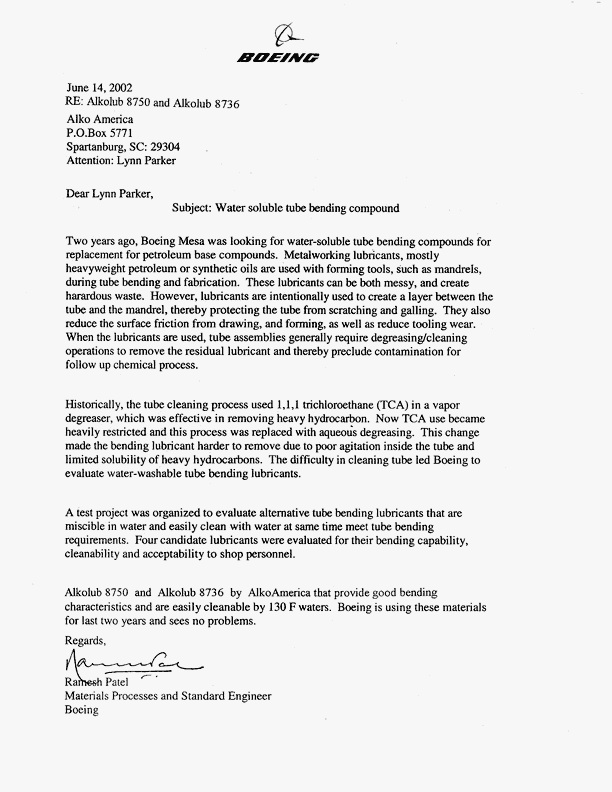P.O Box 5771
Spartanburg, SC 29304
Phone: (864) 573-7585
FAX: (864) 573-7555
Boeing Letter
Two years ago, Boeing Mesa was looking for water-soluble tube bending compounds for replacement for petroleum base compounds. Metalworking lubricants, mostly heavyweight petroleum or synthetic oils are used with forming tools, such as mandrels, during tube bending and fabrication. These lubricants can be both messy, and create hazardous waste. However, lubricants are intentionally used to create a layer between the tube and the mandrel, thereby protecting the tube from scratching and galling. They also reduce the surface friction from drawing, and forming, as well as reduce tooling wear. When the lubricants are used, tube assemblies generally require degreasing/cleaning operations to remove the residual lubricant and thereby preclude contamination for follow up chemical process.
petroleum base compounds. Metalworking lubricants, mostly heavyweight petroleum or synthetic oils are used with forming tools, such as mandrels, during tube bending and fabrication. These lubricants can be both messy, and create hazardous waste. However, lubricants are intentionally used to create a layer between the tube and the mandrel, thereby protecting the tube from scratching and galling. They also reduce the surface friction from drawing, and forming, as well as reduce tooling wear. When the lubricants are used, tube assemblies generally require degreasing/cleaning operations to remove the residual lubricant and thereby preclude contamination for follow up chemical process.
Historically, the tube cleaning process used 1,1,1 trichlorethane (TCA) in a vapor degreaser, which was effective in removing heavy hydrocarbon. Now TCA use became heavily restricted and this process was replaced with aqueous degreasing. This change made the bending lubricant harder to remove due to poor agitation inside the tube and limited solubility of heavy hydrocarbons. The difficulty in cleaning tube led Boeing to evaluate water-washable tube bending lubricants.
A test project was organized to evaluate alternative tube bending lubricants that are miscible in water and easily clean with water at same time meet tube bending requirements. Four candidate lubricants were evaluated for their bending capability, clean ability, and acceptability to shop personnel.
Alkolub 8750 and Alkolub 8736 by AlkoAmerica that provide good bending characteristics and are easily cleanable by 130 F waters. Boeing is using these materials for last two years and sees no problems.
Ramesh Patel
Materials Processes and Standard Engineer
Boeing
